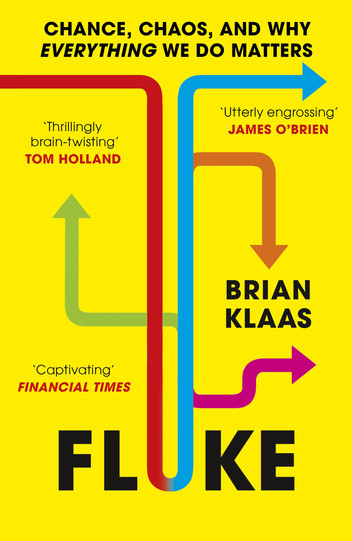Recent Reads: Fluke by Brian Klaas – an interesting nonfiction book about the power of chance in our lives which does itself a considerable disservice in the final (pre-conclusion) chapter.
The basic premise of this book isn’t one the author had to sell me on: that the entire world functions on more sheer chance than most of us want to admit. He makes a good case for this, then discusses the flaws of the social sciences in how they dismiss it, though with thoughtful and non-accusatory commentary on WHY they do that. It gets tedious in places, but it also references one of my favorite movies, Sliding Doors, more than once, so it clearly can’t be all bad. 😁
There are quite a number of interesting historical tidbits used to support his thesis, very few of which I was at all familiar with, and they alone were worth the read. So overall, I enjoyed it.
But there’s a comment in the acknowledgements about how his editor made him cut 20k, much to the good of the manuscript, and it’s my opinion that the editor needed to whack another 10k out of it, because where the book goes wrong is in turning the discussion from personal, economic, social, and global chance shaping everything to…the philosophical question of whether human beings have free will.
I get how he got there, topically. Maybe it’s where he started and the rest was built to support his theories, idk. But I think it’s actually not only irrelevant to his thesis, but actively damaging to it. I think it takes a largely acceptable argument for random chance being a massive catalyst in global affairs (and personal ones) into an incredibly emotional space that undermines what strikes me as a generally rational discussion of a topic people find uncomfortable.
Worse, I feel the way he he presents his argument for determinationsation leaves me, at the very least, with the opinion that it doesn’t matter: we, as a species, generally FEEL as if we have free will; if that feeling is the result of every decision and random chance that has come before…what does that matter? I’m not trying to start a debate here, just relating my takeaway from his conclusions. And because I feel that the thesis of the book was “things are far less in our control than we fight hard to believe they are and it’d probably be generally good for us to accept that,” I really found the final body chapter to be a dissonant disconnect. Particularly because he has a clear opinion on the topic, one which I think … doesn’t matter.
So… mostly worth reading, but I’d skip chapter 12, at least.

Your opinion on free will is also how I feel about the whole “Do we live in a simuation?” debate. It’s interesting to think about and debate, but it really doesn’t matter. We can never really know, and knowing one way or the other wouldn’t change anything for us and the way we need to interact with reality.
100%!